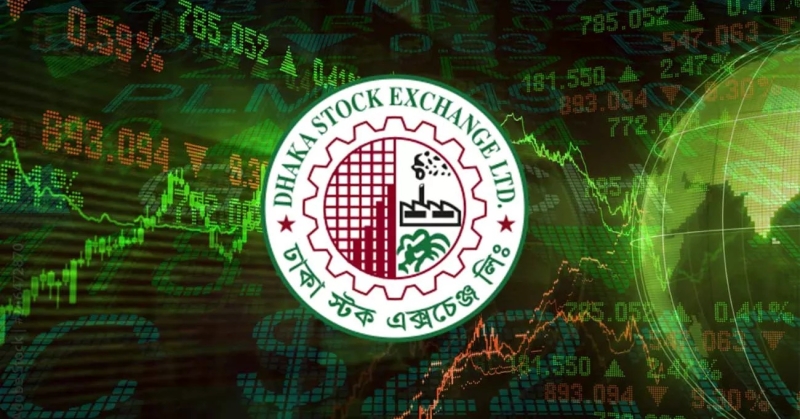- Stock Market key indexes rise, but SME sector struggles |
- International Criminal Court condemns US sanctions move |
- Yao Wen looks for grand celeb of 50 years of China-BD ties |
- Jashore’s Godkhali flowers expected to fetch Tk 100 crore |
- Turk warns DR Congo crisis may worsen, without inte’l action |
Stock Market key indexes rise, but SME sector struggles

Dhaka Stock Exchange logo_11zon
Dhaka, Feb 8 - The capital's stock market saw a positive shift this week, with continuous gains boosting key indexes, trading volume, and market capitalisation.
Despite the rise in major indexes, the SME sector had a tough week.
An analysis of the weekly report from the Dhaka Stock Exchange (DSE) reveals that over the five trading days (2–6 February), the benchmark DSEX index increased by 67 points.
Rising from 5,112 points, the index ended the week at 5,179 points, marking a 1.30% gain.
Other DSE indexes also saw upward movement.
The Shariah-based DSES index gained 13 points, reflecting a 1.22% increase compared to the previous week.
Meanwhile, the DS30 index, which tracks blue-chip companies, rose by 9 points over the week.
SME Sector Faces Decline
Despite the rise in key indexes, the SME sector faced a difficult week.
The SME index at DSE dropped by 49.9 points, a decline of 4.60% compared to the previous week.
Traders attribute this downturn to the ongoing tight monetary policy, which has resulted in high interest rates.
Speaking on the crisis, textile trader Sabbir Hossain said, “Businesses in the SME sector rely heavily on bank loans. With higher interest rates, small and medium enterprises (SMEs) are hesitant to take loans, which restricts business expansion. Lack of investment, reluctance to take loans and uncertainty about repayment have put SMEs under severe pressure.”
Investors believe that the struggling SME sector is impacting the stock market. General investor Tarek Hossain noted, “Stock prices depend largely on the financial health of companies. Since small businesses are struggling, the SME sector index is also suffering.”
Trading and Market Capitalisation Rise
Despite the SME sector’s struggles, overall stock market transactions increased.
At the end of the week, the total trading volume over five days reached Tk 2,132 crore, up from Tk 1,694 crore in the previous week.
Daily average turnover also saw an increase, rising from Tk 338 crore to Tk 426 crore, reflecting a growth of over 25%.
Alongside increased trading activity, DSE’s market capitalisation also expanded.
Over five days, the market capitalisation grew by Tk 9,105 crore, a 1.37% increase from the previous week.
Share Price Trends and Investor Focus
A majority of listed companies saw their stock prices rise this week.
The prices of 265 companies increased, while 103 declined and 27 remained unchanged.
On the overall positive market trend, Executive Director of the Bangladesh Securities and Exchange Commission (BSEC), Rezaul Karim, said, “The new commission does not interfere in the market. This allows the market to function naturally—neither booming overnight nor collapsing suddenly. The positive outcomes of the commission’s market-friendly policies are reflected in this week’s trading.”
Interestingly, none of the top 10 gainers this week belonged to the A-category. Among them, five were from the B-category, while the remaining five were from the Z-category. On the other hand, four of the top 10 declining stocks were from the A-category.
A review of the weekly trading pattern shows that many investors are showing increased interest in weak-performing stocks due to rising prices.
Commenting on this trend, DSE Director Minhaj Mannan Emon said, “The market still faces liquidity shortages. When liquidity remains tight, investors become restless. Many rush to profit quickly or recover previous losses by investing in weak stocks. However, investing in such stocks is highly risky, as most manipulation incidents occur within this segment.”
Banking and Financial Sectors Show Improvement
While the banking and financial sectors had been struggling for some time, they started recovering in the past five trading sessions.
Among 36 listed banks, the share prices of 25 increased, five declined, and six remained unchanged.
At the end of the week, bank stocks saw a collective price increase of 65%, while trading volume surged by over 80%.
Similarly, in the financial institutions sector, no company saw a decline. Among 23 listed financial institutions, 22 recorded price gains, and one remained unchanged. Over the five trading days, stock prices in this sector rose by 75%, while trading activity increased by an impressive 115%.
Stock Market Return and Monetary Policy Expectations
Compared to the previous week, the overall stock market return improved by more than 1%. Among all sectors, financial institutions led with a 4.9% return, followed by the banking sector, which recorded a 1.34% increase.
Market analysts suggest that investors are anticipating no further increases in interest rates under the newly announced monetary policy.
Various sources within the central bank have indicated that the upcoming policy will be contractionary, reflecting the country’s current economic situation.
Experts believe this has already started having a positive impact on the stock market. - UNB

